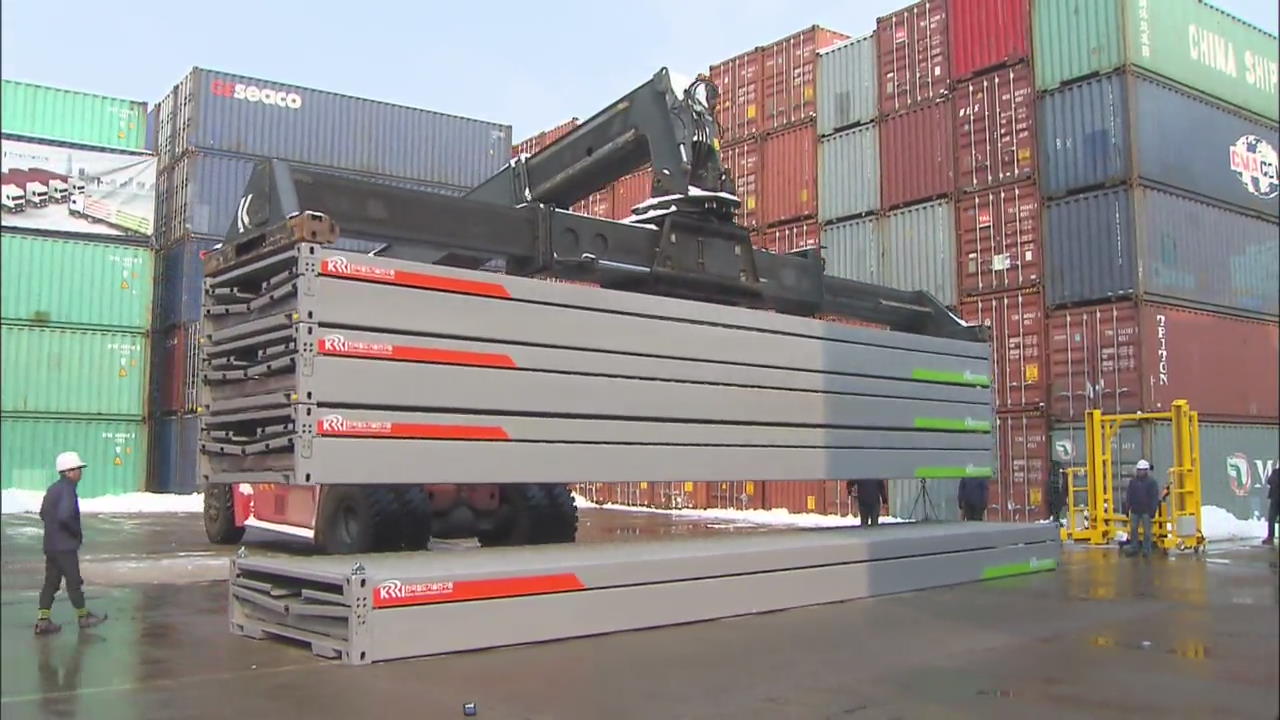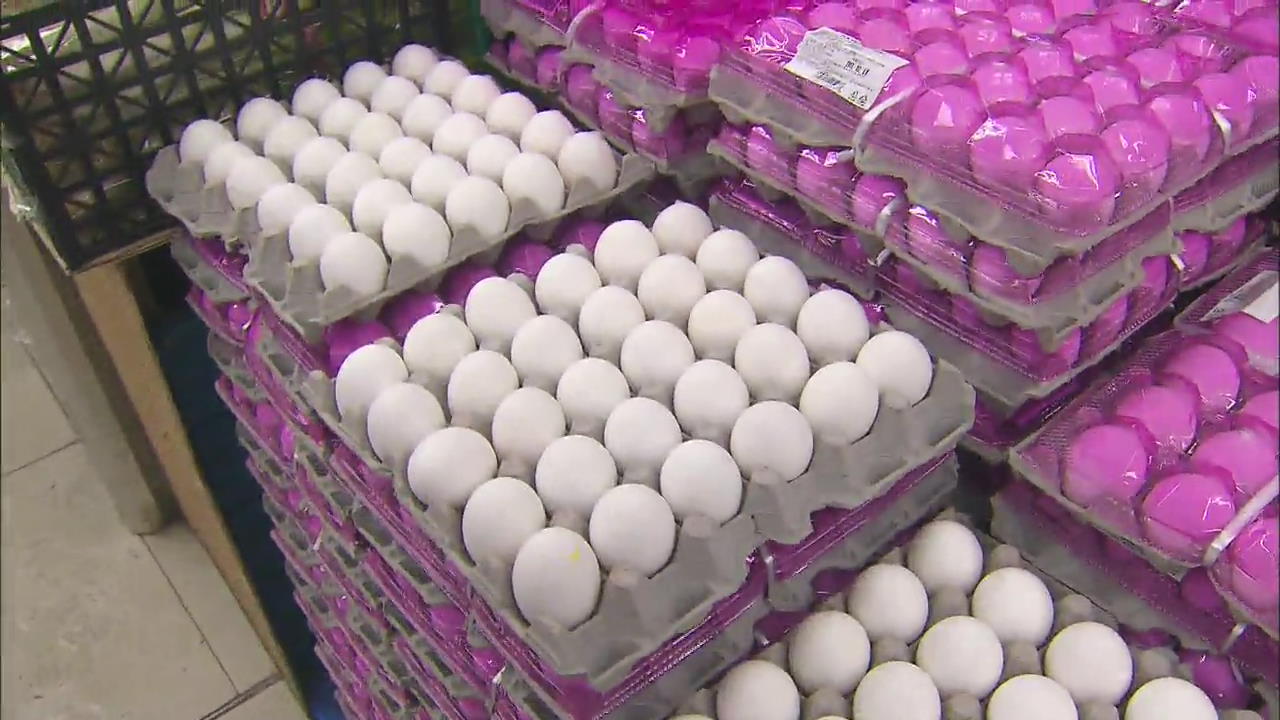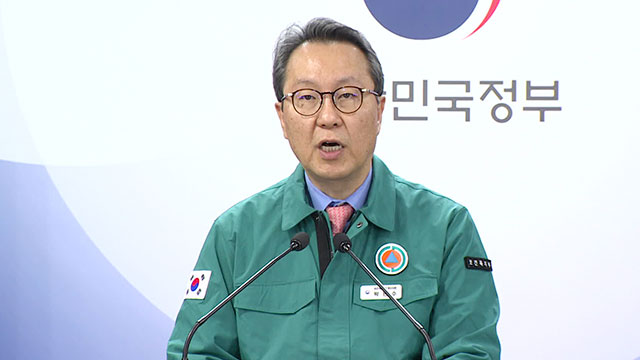Folding Containers
입력 2017.01.23 (14:19)
수정 2017.01.23 (14:24)
읽어주기 기능은 크롬기반의
브라우저에서만 사용하실 수 있습니다.
[Anchor Lead]
Wouldn't it be convenient if a cargo container could be folded up like a paper box for storage and transport? This very technology has been developed in Korea, with high expectations Korean companies will be more competitive in the global logistics market. Here’s more.
[Pkg]
Cargo containers are stacked high on a vessel coming into port. But a quarter of them are actually empty, carrying no freight. It costs over 6.8 billion dollars worldwide to transport empty containers every year. This poses a major problem for the logistics industry.
[Soundbite] Jeong Seong-ryong(Logistics Research Team, CJ Korea Express) : "Transport fees for containers are typically charged by volume. An empty container therefore costs the same as a full one."
A folding container has been developed to address this problematic issue. Using the technology, empty containers are folded up to make them flatter and reduce their volume. By simply pushing buttons found on both ends of a container, the sides consisting of two panels fold up like a milk carton. With four folded containers taking up the space occupied by a single regular container, this saves significant room on cargo ships. Transport and storage costs are also reduced to just a quarter of the previous level while work efficiency is boosted three-fold. The folding technology may appear simple, but its commercialization is a difficult challenge.
[Soundbite] Kwon Yong-jang(Korea Railroad Research Institute) : "Research has been done in the Netherlands and the U.S. for 30 years, but they encountered technical issues and other obstacles regarding the folding method."
The government aims to commercialize the groundbreaking technology by 2019 for Korea to gain a competitive edge in the global logistics market.
Wouldn't it be convenient if a cargo container could be folded up like a paper box for storage and transport? This very technology has been developed in Korea, with high expectations Korean companies will be more competitive in the global logistics market. Here’s more.
[Pkg]
Cargo containers are stacked high on a vessel coming into port. But a quarter of them are actually empty, carrying no freight. It costs over 6.8 billion dollars worldwide to transport empty containers every year. This poses a major problem for the logistics industry.
[Soundbite] Jeong Seong-ryong(Logistics Research Team, CJ Korea Express) : "Transport fees for containers are typically charged by volume. An empty container therefore costs the same as a full one."
A folding container has been developed to address this problematic issue. Using the technology, empty containers are folded up to make them flatter and reduce their volume. By simply pushing buttons found on both ends of a container, the sides consisting of two panels fold up like a milk carton. With four folded containers taking up the space occupied by a single regular container, this saves significant room on cargo ships. Transport and storage costs are also reduced to just a quarter of the previous level while work efficiency is boosted three-fold. The folding technology may appear simple, but its commercialization is a difficult challenge.
[Soundbite] Kwon Yong-jang(Korea Railroad Research Institute) : "Research has been done in the Netherlands and the U.S. for 30 years, but they encountered technical issues and other obstacles regarding the folding method."
The government aims to commercialize the groundbreaking technology by 2019 for Korea to gain a competitive edge in the global logistics market.
■ 제보하기
▷ 카카오톡 : 'KBS제보' 검색, 채널 추가
▷ 전화 : 02-781-1234, 4444
▷ 이메일 : kbs1234@kbs.co.kr
▷ 유튜브, 네이버, 카카오에서도 KBS뉴스를 구독해주세요!
- Folding Containers
-
- 입력 2017-01-23 14:20:25
- 수정2017-01-23 14:24:17

[Anchor Lead]
Wouldn't it be convenient if a cargo container could be folded up like a paper box for storage and transport? This very technology has been developed in Korea, with high expectations Korean companies will be more competitive in the global logistics market. Here’s more.
[Pkg]
Cargo containers are stacked high on a vessel coming into port. But a quarter of them are actually empty, carrying no freight. It costs over 6.8 billion dollars worldwide to transport empty containers every year. This poses a major problem for the logistics industry.
[Soundbite] Jeong Seong-ryong(Logistics Research Team, CJ Korea Express) : "Transport fees for containers are typically charged by volume. An empty container therefore costs the same as a full one."
A folding container has been developed to address this problematic issue. Using the technology, empty containers are folded up to make them flatter and reduce their volume. By simply pushing buttons found on both ends of a container, the sides consisting of two panels fold up like a milk carton. With four folded containers taking up the space occupied by a single regular container, this saves significant room on cargo ships. Transport and storage costs are also reduced to just a quarter of the previous level while work efficiency is boosted three-fold. The folding technology may appear simple, but its commercialization is a difficult challenge.
[Soundbite] Kwon Yong-jang(Korea Railroad Research Institute) : "Research has been done in the Netherlands and the U.S. for 30 years, but they encountered technical issues and other obstacles regarding the folding method."
The government aims to commercialize the groundbreaking technology by 2019 for Korea to gain a competitive edge in the global logistics market.
Wouldn't it be convenient if a cargo container could be folded up like a paper box for storage and transport? This very technology has been developed in Korea, with high expectations Korean companies will be more competitive in the global logistics market. Here’s more.
[Pkg]
Cargo containers are stacked high on a vessel coming into port. But a quarter of them are actually empty, carrying no freight. It costs over 6.8 billion dollars worldwide to transport empty containers every year. This poses a major problem for the logistics industry.
[Soundbite] Jeong Seong-ryong(Logistics Research Team, CJ Korea Express) : "Transport fees for containers are typically charged by volume. An empty container therefore costs the same as a full one."
A folding container has been developed to address this problematic issue. Using the technology, empty containers are folded up to make them flatter and reduce their volume. By simply pushing buttons found on both ends of a container, the sides consisting of two panels fold up like a milk carton. With four folded containers taking up the space occupied by a single regular container, this saves significant room on cargo ships. Transport and storage costs are also reduced to just a quarter of the previous level while work efficiency is boosted three-fold. The folding technology may appear simple, but its commercialization is a difficult challenge.
[Soundbite] Kwon Yong-jang(Korea Railroad Research Institute) : "Research has been done in the Netherlands and the U.S. for 30 years, but they encountered technical issues and other obstacles regarding the folding method."
The government aims to commercialize the groundbreaking technology by 2019 for Korea to gain a competitive edge in the global logistics market.
이 기사가 좋으셨다면
-
좋아요
0
-
응원해요
0
-
후속 원해요
0

















이 기사에 대한 의견을 남겨주세요.